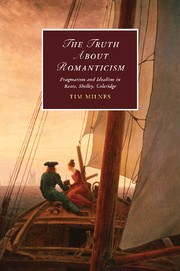Book contents
- Frontmatter
- Contents
- Acknowledgements
- Introduction: The pragmatics of romantic idealism
- 1 Romanticising pragmatism: dialogue and critical method
- 2 Pragmatising romanticism: radical empiricism from Reid to Rorty
- 3 This living Keats: truth, deixis, and correspondence
- 4 An unremitting interchange: Shelley, elenchus, and the education of error
- 5 The embodiment of reason: Coleridge on language, logic, and ethics
- Conclusion
- Notes
- Bibliography
- Index
- CAMBRIDGE STUDIES IN ROMANTICISM
Introduction: The pragmatics of romantic idealism
Published online by Cambridge University Press: 06 July 2010
- Frontmatter
- Contents
- Acknowledgements
- Introduction: The pragmatics of romantic idealism
- 1 Romanticising pragmatism: dialogue and critical method
- 2 Pragmatising romanticism: radical empiricism from Reid to Rorty
- 3 This living Keats: truth, deixis, and correspondence
- 4 An unremitting interchange: Shelley, elenchus, and the education of error
- 5 The embodiment of reason: Coleridge on language, logic, and ethics
- Conclusion
- Notes
- Bibliography
- Index
- CAMBRIDGE STUDIES IN ROMANTICISM
Summary
O friend! Truth! Truth! but yet Charity! Charity!
Coleridge's plea comes in the midst of an 1804 notebook entry that characteristically combines self-mortification with self-justification. The poet confesses to ‘Drunkenness’ and ‘sensuality’, but begs his future reader to consider, in mitigation, that he ‘never loved Evil for its own sake’. ‘Charity’, he suggests, is the prerequisite for interpreting the ‘Truth’ of his life's work. The passage presents Coleridge at his most strategically disarming, yet it would be wrong to dismiss his appeal as wishful thinking or crafty manipulation. The request for trust, the assumption of generosity on the part of his reader, is no mere sleight of hand. By refusing to subordinate friendship and charity to an abstract idea of truth, Coleridge trades on a network of romantic ideas concerning the nature of the relationships between truth, charity, and friendship. This network, which forms the central interest of this study, can be characterised broadly as an interest in the interdependence of truth and intersubjectivity. More concisely, and contentiously, it can be described as a kind of pragmatism.
In choosing the last descriptor, I am not claiming that the writers discussed here are essentially pragmatists: as I argue below, the growth of naturalism in the nineteenth-century forms a formidable barrier between the romantics and pragmatists such as William James and John Dewey. When, for example, Coleridge defines the ‘Ideal’ as the ‘union of the Universal and the Individual’, he subjects the possibility of redescription to a transcendental ideal in a way that is quite alien to pragmatism.
- Type
- Chapter
- Information
- The Truth about RomanticismPragmatism and Idealism in Keats, Shelley, Coleridge, pp. 1 - 14Publisher: Cambridge University PressPrint publication year: 2010



